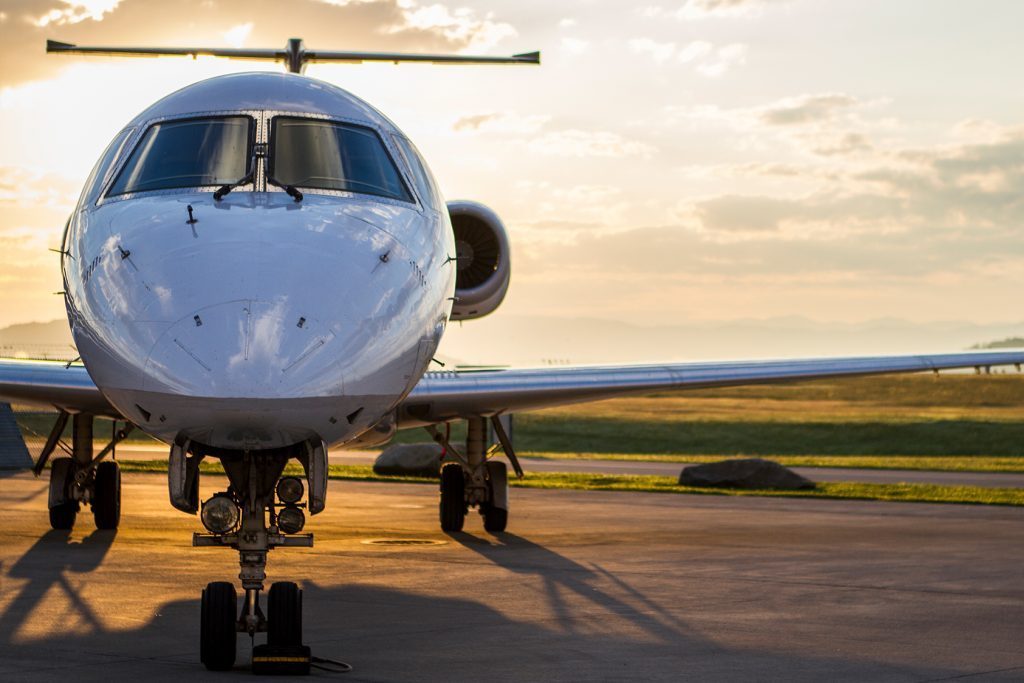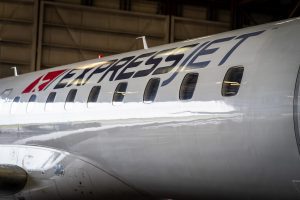Can a Downsized Regional Airline Relaunch in a Pandemic? ExpressJet Thinks It Can

Skift Take
Amid the devastating pandemic, a moment of hope opened the door for ExpressJet Airlines, formerly the nation’s largest regional airline, to seriously think about restarting its commercial operations.
The carrier, which flew in partnership with for major U.S. airlines, plans to launch service on its own this fall.
ExpressJet was forced to cease flying when United terminated its United Express contract with the regional carrier last September. It was the announcement of the Payroll Support Program Extension or PSP2, which the company applied for but didn’t get, that triggered ExpressJet’s desire to reboot, said CEO Subodh Karnik.
“When PSP2 occurred, we said there is an opportunity for the company to do something from a fiduciary perspective and we just couldn't keel over and die,” Karnik said. “So we had to say, ‘you've got this pool of 3,000 union employees that are on furlough, and we have bills to pay,’ how do we make it all come together?”
After creating a business plan, ExpressJet submitted its application to the U.S. Department of Transportation’s Fitness Authority to reinstate the airline’s ability to fly commercially.
The Transportation Department released its final fitness order July 30, allowing ExpressJet to restart commercial operations, in part thanks to its balance sheets, including $14 million received in federal aid under the Cares Act and U.S. Small Business Administration's Paycheck Protection Program, an ExpressJet spokesperson said.
Georgia-based ExpressJet would resume operations under its brand during the third quarter sometime in September, with its first full month of operations slated for October. It would operate the 50-seat Embraer-145 aircraft the airline is known for to cities with unmet needs, Karnik said.
This is not the first time the regional airline has attempted to launch its brand. After Continental Airlines reduced ExpressJet’s flying by 69 aircraft under then CEO Jim Ream, ExpressJet retained the planes to fly under its banner providing direct commercial flights from 2007 to 2008, but then had to abandon independent flying. It also flew charter flights at the time for professional sports teams and then-presidential candidate Barack Obama when his aircraft broke down.
Throughout its 35 years of flying, ExpressJet has also flown for legacy carriers American and Delta.
An amalgamation of Atlantic Southeast Airlines and Continental Express, ExpressJet is 50.1 percent majority-owned by KAir Enterprises, whose primary shareholder is Karnik, and 49.9 percent minority-owned by United Airlines.
Karnik said in an interview United doesn’t have any objections to ExpressJet resuming scheduled operations as an independent carrier. The regional airline, which had to furlough or retire its 3,000 employees last year, would be resuming operations with only about a tenth of its former staff by the end of the first 12 months.
Smaller But Better
Although in the beginning, ExpressJet would be starting small, its first-year growth plan includes adding an aircraft every other month. Depending on demand and reception, the airline expects to speed up growth and recall several hundred more employees by the end of 2022.
While flying a 50 seater on a cost-per-seat basis may be more expensive than a 737 or a bigger jet, Karnik said the number of people required to fill it is fewer.
Karnik said keeping it simple and efficient will help make the airline profitable. As a result, ExpressJet would start by building its strength on the airplane it knows, the Embraer 145, with people who can come back and fly it, he said.
IN TERMS OF EMPLOYEES
The Air Line Pilots Association, representing ExpressJet pilots, said collective bargaining agreements for its pilots remain in effect.
“We are currently working with management on how best to move forward with this initial restart and will continue to help rebuild airline operations to ensure that our pilots are well positioned for success,” an union spokesperson said.
Karnik says he plans to have up to 300 or more employees, in total, by the end of the first year. He believes company-wide it would be easier to bring back furloughed employees already familiar with the airline rather than hire new ones.
Internal polling of furloughed employees to weigh interest in returning showed a higher number of yes’s and maybe’s, the CEO said.
“Even if a small subset of the people who have said yes actually show, we've got the next nine months to one year covered,” Karnik said.
ExpressJet has been in contact with the International Association of Machinists and Aerospace Workers representing ExpressJet flight attendants since April, sharing its business and recall plans with the union, said IAM spokesperson David Supplee.
While no new negotiations have taken place, Supplee said the airline is anticipating recalling six flight attendants initially, growing to around 50 flight attendants at the end of 12 months as more aircraft are added. He added that the union is anticipating recalls to start soon due to training.
Some union leaders, however, said employees have shown relatively little to no interest in returning to work.
“With only one aircraft and no defined routes it’s hard to say how many would return and to where,” said David Bourne, spokesperson for the International Brotherhood of Teamsters, representing mechanics and related classifications.
Every union Skift spoke with referred to the contracts or collective bargaining agreements previously in place as still standing.
“I have been on one call where they described the needs of the carrier but we have a contract in place that provides specific wages, work rules, and benefits,” said Gary Peterson, spokesperson for the Transport Workers Union representing dispatch. “I am waiting to receive an actual “operational plan” before getting members’ hopes up.”
FUTURE AND SPENDING
Hesitant to disclose routes not yet finalized, Karnik said potential places ExpressJet would be flying to include small, underserved locations where people don't have choices, and their alternative is to drive or fly for hours.
This includes focusing on abandoned markets, cities, and consumer needs that have seen fewer or no service as a result of the pandemic through a point-to-point approach or direct flights in layman terms.
One thing Karnik did coyly confirm is Atlanta will not be the airline’s first base.
Currently, the regional airline has been able to lease two Embraer 145 aircraft and has a third on its way. The airline plans to incur $360,000 in aircraft deposit expenditures for these aircraft for the first 12 months, it said in its Transportation Department filing.
“So effectively, by the end of August, we will have three airplanes, and then the plan will be between one to three airplanes per month, depending on how the business goes,” Karnik said.
With a management team and trainers already in place, Karnik said the focus during the next three weeks is about getting everything started and in place and subcontracting out commercial functions.
“All of these things have been softly worked on,” Karnik said. “A lot of it will have to do with bringing people, locking in our network plans, and starting the process of establishing and locking in relationships with airports and things like that.”
In its May filing with the Transportation Department, the company said it has a capital balance of $29 million and total liabilities of $14 million. ExpressJet anticipates operating costs of approximately $60.4 million during the 12 months following its resumption of scheduled service.
And what happens if ExpressJet is wildly successful and the majors come calling? Karnik said he doesn’t know.
But he said if, for instance, American’s Robert Isom were to call and tell him, "hey, open your front door there's a sack of gold coins sitting up there," of course Karnik would want to do a deal.
He cautions that it's all wishful thinking and not something ExpressJet is currently contemplating or can consider. For now, all its focus is on getting the airline rebooted and back in the skies.
Note: Ruthy Muñoz is a former ExpressJet flight attendant.






